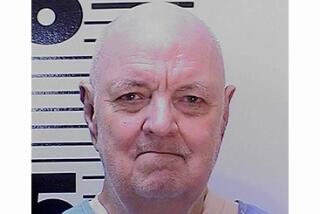Death Penalty for McVeigh
- Share via
Re “McVeigh Gets Death,” June 14: While I agree with the sentence, I cannot celebrate it. Bombing that building for a “just cause” seems almost understandable in our culture. We all grew up enjoying endless portrayals of justified vengeance and homicide on TV. We are angered by acquittals, legal technicalities and cover-ups, while enraged at any threat to our own rights. We like simple solutions. We cheer death sentences.
Executing Timothy McVeigh will not deter violence. It will likely provide someone else a “reason” to kill.
MICHAEL DIENER
Duarte
After the jury found McVeigh guilty and sentenced him to death, McVeigh’s mother blamed the government and the media for her son’s sentencing. “I’m not saying he didn’t have a fair trial. I’m just saying that I don’t think it was done right from the beginning,” she said.
She’s wrong about the government and the media; however, she’s correct on her second point. But the beginning was in Oklahoma City a little more than two years ago.
DIXON GAYER
Huntington Beach
Your June 12 editorial urging the death penalty for McVeigh is a shallow defense of the newspaper’s change in position regarding the death penalty. Truly, the crime was horrific and the death penalty is justified. However, to apply the rationale of mass murder, and the problems of poor people and/or minorities who cannot afford good lawyers, is a cop-out to continue the paper’s argument against the death penalty for most murderers.
If someone is convicted of premeditated murder, the death penalty is applicable. If a person who is accused of murder cannot afford adequate trial representation, let’s fix the judicial system. Perhaps a trial that is conducted in front of a panel of judges who are familiar with all the lawyer tricks and/or deficiencies is appropriate.
SION COLVIN
Woodland Hills
Bravo for your editorial. Whatever one’s views are on the death penalty, this unspeakable act was tantamount to an act of war and gives a new interpretation to the word “traitor.” In years gone by there was only one punishment for betrayal and that was death.
VIVIENNE S. BLUETT
Los Angeles
I’m shocked at your editorial. In it you show yourself to be of the same “eye for an eye” mind-set as McVeigh himself. He believed innocent men, women and children had been killed by an evil government at Waco, hence the evil government must be destroyed. You believe an evil McVeigh killed innocent men, women and children in Oklahoma, hence McVeigh must be destroyed.
The death penalty teaches violence as a solution to a problem, and you would have the government, the entity Justice Louis Brandeis called the most potent teacher of all, teaching this awful lesson. As Gandhi observed, “An eye for an eye leaves the whole world blind.”
ANNE ALPER
Pacific Palisades
In its editorial, The Times reinforces false stereotypes about public defenders and private lawyers. It is among presumed “good lawyers” who charge “big money” that competence and devotion vary wildly; in contrast, the consistent devotion and skill of public defenders show particularly in the many cases in which we prevail, though our clients are not celebrities. It is a celebrity defendant’s star quality, and possibly the evidence, rather than the private lawyer’s superiority, that leads to the acquittals that you imply were wrongful.
What is even more disturbing is that The Times rushed to a death judgment. Though The Times seeks to improve our justice system, this type of editorial instead undermines it by intruding upon a jury’s determination.
MARK WINDHAM
Deputy Public Defender
Los Angeles
We don’t rape women to prevent rape; we don’t steal to prevent theft. Why is it OK to murder people to prevent murder? And don’t kid yourself, the death penalty is murder.
ROBERT S. COLTON
North Hills
More to Read
Sign up for Essential California
The most important California stories and recommendations in your inbox every morning.
You may occasionally receive promotional content from the Los Angeles Times.










